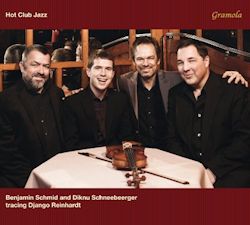Lulu's Swing
Viper's Dream
Babik
Ou es-tu mon amour?
Minor Blues
What is this thing called love?
My Serenade
Douce ambiance
Si tu savais
Made for Wesley
Blue Drag
Belleville
Limehouse Blues
Swing 42
Gipsy Fire
Seavas Koarl
R-vingt-six
Benjamin Schmid Jazz Quartet
Recorded December 2013, Tonstudio Baumann, Steinakirchen, Austria [70:35]
The album title succinctly sets the scene. This is something of an homage to – but certainly no slavish copy of – the Quintet of the Hot Club of France and
in particular the dedication is to Django Reinhardt. This may seem odd given that Benjamin Schmid is a violinist taking on the Stephane Grappelli role but
in point of fact the homage is to both great players. With him are guitarists Diknu Schneeberger and Martin Spitzer, and bassist Joschi Schneeberger. The
booklet and card sleeve can’t decide on the correct spelling of ‘Schneeberger’ which makes one think they may not be related, but they are indeed father
and son - Joschi is the father.
The programme is nicely varied, spiced by a few of Django’s own compositions and by Lulu’s Swing, composed by Lulu Reinhardt, Django’s
grand-nephew. Schmid plays well in the lower register here, somewhat emulating Grappelli, and whilst the springy bounce-rhythm is inevitably reminiscent of
the QHCF, the group manages to retain its own corporate identity. It was clever to dust off Fletcher Allen’s Viper’s Dream as it gives Schmid the
chance to espouse his nicely angular bluesy lines. Romantic chanson is encountered in Ou es-tu mon amour? which Schmid plays effusively and he
takes advantage of several opportunities to unleash some virtuosic bowing in What is this thing called love? Django’s My Serenade
encourages Schmid to explore his neo-classical side in this repertoire, almost going off on a Dvořák-Smetana train of musical thought, and it’s good to
hear Diknu Schneeberger take a fine, extensive solo on Douce Ambience, another much-less often encountered Django composition. Rinus Steinback – a
name to conjure with – wrote the contemporary song Made for Wesley which Schmid and his group convert into a QHCF vehicle with sinuous ease. As
for the violinist he gives real ‘lift’ to his phraseology in Belleville and some taut, even aggressive lines to Limehouse Blues. Above
all there is no sign of the dreaded sin of the classical fiddler – rhythmic slackness and a tentative improvisatory approach. Schmid is well versed in this
metier by now and it’s all systems go with him.
This fine band has an outstanding violin-leader, an excellent up-and-coming solo guitarist and enviably equipped supporting ensemble players. It’s also
very valuable to hear some of the songs Django wrote but never had the opportunity to record. An extra star for that.
Jonathan Woolf
